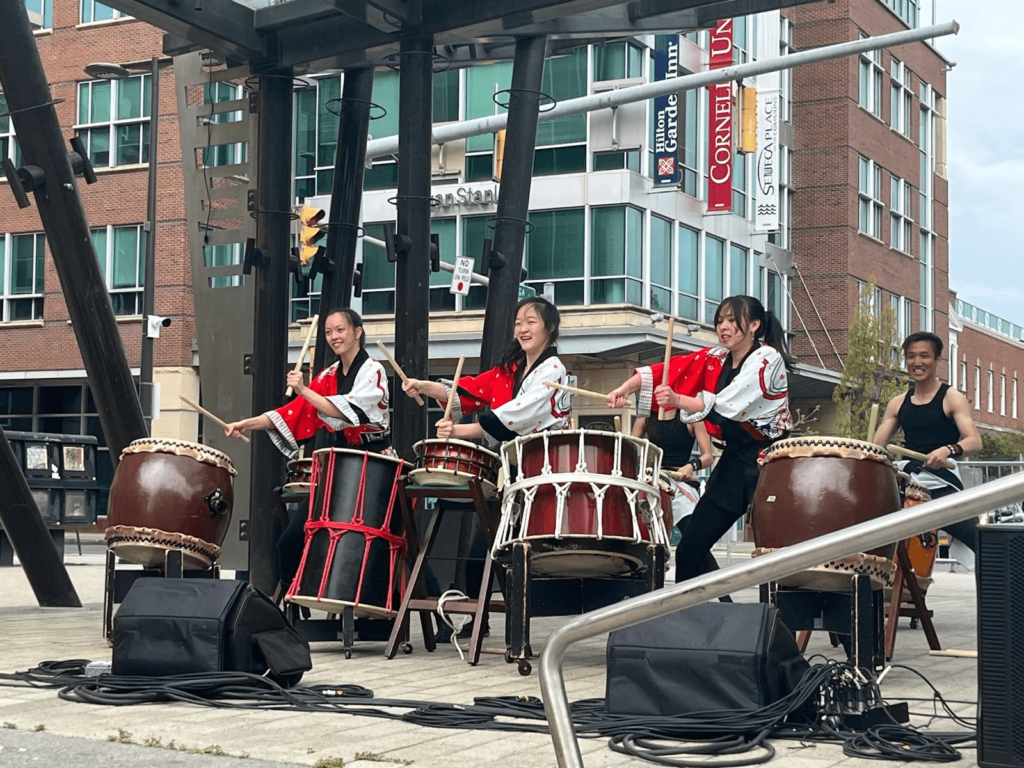Since 1990, May has been celebrated as Asian American and Pacific Islander Heritage Month, an opportunity to honor and celebrate the AANHPI (Asian American, Native Hawaiian and Pacific Islander) community’s vibrant cultural heritage and to raise awareness of the issues they continue to face. To bring the celebration of the AANHPI community to Ithaca, the History Center in Tompkins County organized its first annual AANHPI Heritage Month Celebration on May 4, 2024.
The project, although a substantial undertaking, was planned in a short amount of time. “We had been working with some individual families from Tompkins County on expanding and preserving Asian American history as it relates to our community. As we were having these dialogues, it was voiced to us from many community members that an event like this was important and part of building relationships,” said Benjamin Sandberg, director of the History Center.
At the event, the History Center displayed a qipao, a traditional Chinese dress, and other artifacts from the Tang family. The Tangs were the owners of Asiatic Garden, one of the first Asian restaurants in Ithaca. The restaurant was forced to move in the mid-1960s because of an urban renewal product, and due to racial prejudice against Chinese cuisine, the Tangs had trouble finding a new space. Eventually, they moved into 118 West State Street, where the Asiatic Garden operated until 2001. At the time of its closing, it was the longest-running Asian restaurant in Ithaca.
The event also featured representatives from various local groups, including the Cornell Taiwanese Student Organization, a student group that helps Taiwanese students acclimate to Cornell University and feel connected to their culture during their time at Cornell. Zong-Yan Liu, the president of the organization, said that the goal of the organization is to “help Taiwanese students apply for a Visa, find a place to rent, and really be accepted at Cornell University.” Although the organization has been around for nearly two decades, Liu expressed that the organization “still [has] the same passion to share our culture with others.”
Another program highlighted at the event was the Cornell Southeast Asia Program, which connects students to opportunities at Cornell and abroad to study Southeast Asian culture. As Emily Falica, the administrative assistant for the program, explained, area studies help students “learn about people, languages, and cultures that sometimes we just never see in our own communities […] which ultimately makes things more diverse, more caring, and more empathetic to everyone in the world around us.”
The event hosted a lineup of local performers representing different AANHPI cultures. Among the performers were 14Strings!, a Filipino rondalla and guitar ensemble. Their name originated from the fourteen-stringed instruments that most of the ensemble plays, including the bandurria, the laud, and the octavina. Drumming groups like Yamatai and Shimtah represented Japanese Taiko drumming and traditional Korean percussion, respectively, and Saarang performed Indian classical music. The event also showcased novelty acts like the Pro-Yos (Chinese yo-yo) and Aikido (Japanese martial arts). The performances by multiple local groups added an enriching experience to the event, providing an opportunity for attendees to appreciate and learn about the diverse AANHPI cultures through music.
Overall, the first annual AANHPI Heritage Month Celebration brought the community together through a shared interest in and love for AANHPI culture. It has the potential to grow in the years to come. Sandberg expressed enthusiasm at the idea of expanding the project, saying that “It is our dream and hope [to make this an annual event]. It’s exciting to lay the groundwork for what could come in the future.”

Yamatai’s performance at the AANHPI Celebration. Zadie Wang
